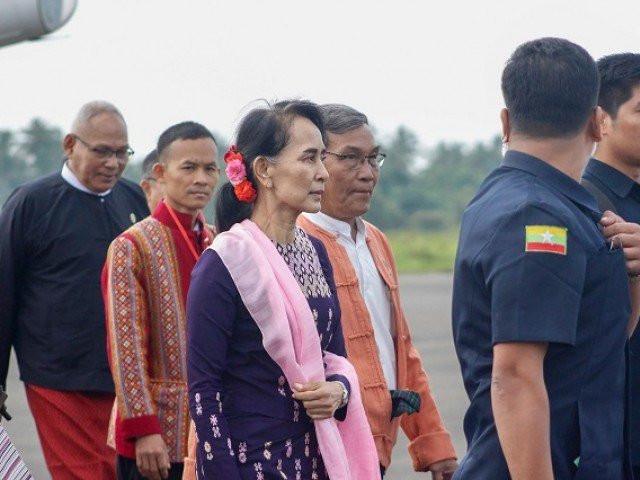
Myanmar’s leader Aung San Suu Kyi arrived on her first visit to conflict-battered northern Rakhine State on Nov. 2, an official said, an unannounced trip to an area that has seen most of its Rohingya Muslim population forced out by an army campaign.
Suu Kyi, a nobel laureate who leads Myanmar’s pro-democracy party, has been hammered by the international community for failing to use her moral power to speak up in defence of the Rohingya.
Some 600,000 of the stateless minority have fled to Bangladesh since late August carrying accounts of murder, rape and arson at the hands of Myanmar’s army, after militant raids sparked a ferocious military crackdown.
The UN says that crackdown is tantamount to ethnic cleansing, while pressure has mounted on Myanmar to provide security for the Rohingya and allow people to return home.
"The State Counsellor (Suu Kyi’s official title) is now in Sittwe and will go to Maungdaw and Buthidaung too. It will be a day trip," government spokesman Zaw Htay told AFP, mentioning two of the epicentres of the violence but without elaborating on her schedule.
It is her first trip in office to northern Rakhine, which has seen some of the worst of the communal violence that has cut through the western state since 2012, severely damaging Myanmar’s global reputation.
It was not clear if Suu Kyi would visit some of the hundreds of Rohingya villages torched by the army -- allegedly aided by ethnic Rakhine Buddhist locals -- or if she would be taken to see remaining clusters of the Muslim group, who are living in fear and hunger surrounded by hostile neighbours.
Thousands of others are believed to still be camped on a beach near Maungdaw awaiting boats to Bangladesh in increasingly parlous conditions.
The Rohingya are hated in Buddhist-majority Myanmar, where they are denied citizenship and widely dismissed as illegal "Bengali" immigrants.
Their legal status is at the crux of communal tensions, with ethnic Rakhine Buddhists adamant that Rohingya are foreign interlopers.
A Rohingya resident of Maungdaw town who has stayed despite soaring tensions appealed to Suu Kyi to reconsider foisting a controversial national verification card (NVC) on the minority.
The card grants them limited rights to residence in Myanmar, but does not recognise them as Rohingya and therefore an ethnic group with citizenship rights.
The Muslim group say the NVC is another bureaucratic attempt erase their identity, forcing a shaky temporary legal status onto the Rohingya in a region where they claim generations of ancestry.
"We can not do anything with this NVC card, so we do not want to receive it," the resident said, requesting anonymity fearing reprisals.
"We are not Bengalis from Bangladesh, we are Rohingya living here for generations."
Observers say Suu Kyi has chosen not to criticise the army in fear of a backlash from a powerful institution that controls all security matters.
The political-prisoner-turned-politician was accompanied on her Rakhine trip by powerful Myanmar businessman Zaw Zaw, one of a host of "cronies" of the military who thrived under junta rule and who are now taking a prominent role in infrastructure projects in the battered region.
The plight of the Rohingya garners little sympathy inside Myanmar, making any defence of the minority a politically unpopular cause amid surging Buddhist nationalist sentiment.
Suu Kyi heads a committee charged with rebuilding Rakhine and repatriating Rohingya from Bangladesh who meet strict criteria for re-entry to Myanmar.
On Nov. 1, spokesman Zaw Htay accused Bangladesh of delaying the start of the repatriation process.
Dhaka has yet to send an official list of the Rohingya who have fled since August 25, he told AFP.
The Rohingya have packed into makeshift camps on a poor, already overcrowded slip of border land inside Bangladesh.
Aid groups say the risk of major outbreaks of disease is high while they struggle to deliver food and basic supplies to the unprecedented number of refugees.
The violence, which the U.N. describes as ethnic cleansing, has pushed more than 600,000 Rohingya into Bangladesh.